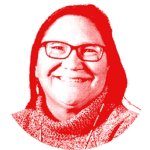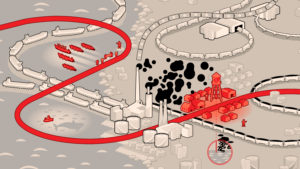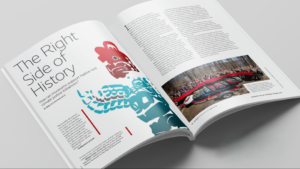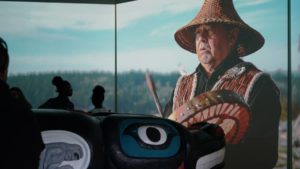We’re thrilled to share an update on our Red Natural History Fellowship program, which brings together a visionary group of eight scholar-activists to advance a “natural history for our world in crisis” — a vision and practice of natural history that refuses to silo ecological concerns from the colonial, capitalist, and imperialist forces that produce them.
As we approach the midpoint of this journey, it’s a moment to reflect on the achievements of our first cohort of Red Natural History Fellows. Their research, talks, advocacy, and writing can help us to understand the tumultuous world we live in — how we got here, and how we can chart a path forward.
Below, you’ll find a curated selection of links and resources showcasing highlights from our fellows’ endeavors. We invite you to explore these materials and join us in envisioning and working toward a just and livable future for all.
_________________________
Red Natural History: A Year in Review
 |
Ashley Dawson Ashley Dawson has just published his newest book, Environmentalism From Below: How Global People’s Movements Are Leading the Fight for Our Planet, which explores how communities across the Global South have long been at the forefront of the fight to protect our imperiled world.→ RSVP: Join Ashley for a live-streamed conversation with philosopher Olúfẹ́mi O. Táíwò on January 18. → Check out Ashley’s latest op-ed in Truthout, exposing how so-called “solutions” discussed at the UN COP28 climate summit in Dubai threaten to displace Indigenous communities around the world. |
 |
Rosalyn LaPier (Blackfeet/Métis) It’s been a big year for Indigenous ethnobotanist and historian Rosalyn LaPier. In addition to playing a pivotal role as advisor and interviewee for the new PBS documentary The American Buffalo, Rosalyn has written extensively this year on Indigenous worldviews–powerfully showing us how the stories of the ancestors can orient us in our shared struggle to build a just and sustainable future. → Explore Rosalyn’s recent writing on efforts to re-Indigenize university campuses, protect water, and restore Indigenous relations to land and animals. |
 |
Andrew Curley (Diné) Geographer Andrew Curley’s first book, Carbon Sovereignty: Coal, Development, and Energy Transition in the Navajo Nation came out last spring with University of Arizona Press. The book traces the history of coal development within the Navajo Nation, the struggle for energy independence in an “energy rich” region, and the real dilemmas faced by Native Nations forced to live under colonial capitalism. → Read this interview with Andrew, featured on the University of Arizona Press website. |
 |
Kai Bosworth This year, geographer Kai Bosworth launched a special issue of the radical geography journal Antipode on “the blockade” — which has become a central tactic for communities struggling to protect land, water, and cultural heritage. Kai’s first book Pipeline Populism: Grassroots Environmentalism in the Twenty-First Century is also generating much enthusiasm. In addition to receiving an Outstanding Book Award from the American Association of Geographers, the book is the topic of a new online forum in Society & Space magazine. → Check out the essay forum on Pipeline Populism. |
 |
Dina Gilio-Whitaker (Colville Confederated Tribes) Dina Gilio-Whitaker, award-winning author of As Long as the Grass Grows, has been working on a new book that sheds light on the rising incidence of “Pretendianism” in the US — tracing how contemporary Native identities have been shaped by the assimilationist policies of the US government. → Listen to Dina in this new NPR podcast on Indigenous stewardship and climate change. |
 |
Alberto Acosta Ecuadorian economist Alberto Acosta, who was a key figure in the fight to defend Ecuador’s sacred Yasuni National Forest from extraction, has been exploring how the Rights of Nature can be mobilized in grassroots struggles for climate and environmental justice, publishing new articles in Climática and Ecuador Today. → Take a look at Acosta’s new essays on the Rights of Nature and COP28. |
 |
Natchee Blu Barnd Ethnic studies scholar Natchee Blu Barnd has been pushing for sector-wide change in higher education, drawing on the activist heritage of his discipline. As interim director of the Difference, Power, and Oppression Program at Oregon State University, he is helping faculty across the university address “institutionalized systems of power, privilege, and inequity in the United States” in their curricula. → Listen to Natchee on the podcast “Transforming the College Classroom,” (Episode 4: ‘History is Always the Present’). |
 |
Billy Fleming Landscape architect Billy Fleming has been asking how designers and landscape architects can forge alliances with insurgent movements for climate and environmental justice. In addition to co-editing a forthcoming issue of the Journal of Architectural Education, Billy is also engaged in a multi-year research project on energy transition in Greenland–connecting his students with activists on the front lines of the climate struggle. → For more on Billy’s work in Greenland, check out “Fire, Ice, and Ore: Arctic Elements, Indigenous Resistance, and the Global Energy Transition,” a recent talk at e-flux in New York. |





